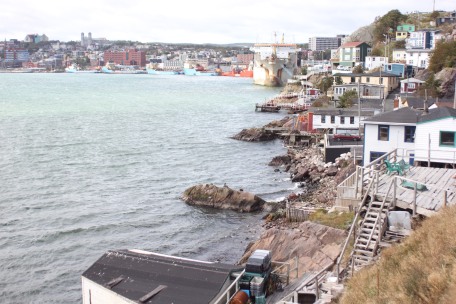This is the general topic of the next course in our PhD programme by the Uarctic Thematic Network “Arctic Extractive Industries. It’s going to take place this time again in the wonderful town of St John’s Newfoundland, Canada.

PhD students who have an interest in participating (this time self-funded, I hope you find funds to come!!!), can write a 200 words abstract to one of the organisers. Spaces are limited, especially because of the limited presentation slots that we have at the conference, in conjunction to which we will hold this. Preference will be given to those who
1) already participated in an earlier course in our programme and want to complete the entire Uarctic certificate;
2) PhD students willing to commit to completing the program and to presenting at Petrocultures; and
3) Master’s students interesting in participating more or less as observers.
For European students: Uarctic TN partner students can use this course for 10 credits ECTS towards their PhD studies, if approved by their supervisor and completed fully with submitted paper. The Ulapland course code is TUKO 1217.
Here is a course abstract:
An interdisciplinary exploration of resource development versus other community sustainability options’
St. John’s Newfoundland; Aug 29 to Sun Sept 04, 2016.
We will be offering an intensive one-week PhD course comingled with the Petrocultures conference in St. John’s beginning on Monday aug 29, 2016. The theme of this course is ‘An interdisciplinary exploration of resource development versus other community sustainability options’. In brief, there are many reasons why resource development in remote regions can be damaging in social, environmental and economic terms. Yet, alternatives that can lead to sustainable economic security for remote peoples are often elusive, while resource development promises opportunities for local residents.
Our group, the Uarctic Thematic Network in Extractive Industries, has offered semi-annual PhD courses of this nature since 2012. This course will differ from some of the previous one in format: the first two days will consist of three seminars of roughly 2.5 hours’ duration. Each of those six seminars will be co-presented by one faculty member and one or several PhD students. The purpose of these co-presented seminars is to maximize student involvement, and to facilitate an exploration of ideas and implications, and relevant academic readings and theories, across sessions. This will be an interactive course in which students will be expected to join in discussions within each seminar. This format will facilitate even more intensive academic interaction between PhD students and professors.
On the final three days, students in our course will attend the Petrocultures conference, and will present their research within specially designated sessions. There will also be specified conference sessions to attend as part of the course, and a final mandatory discussion session for registered students at the conclusion of the conference, late on September 03, to reflect on the overall themes emerging from the course and conference.
Enquiries: Prof Arn Keeling <akeeling(at)mun.ca>, Prof Gordon Cooke <gcooke(at)mun.ca> (cc to Thematic Network coordinator Florian Stammler <fstammle(at)ulapland.fi>)
